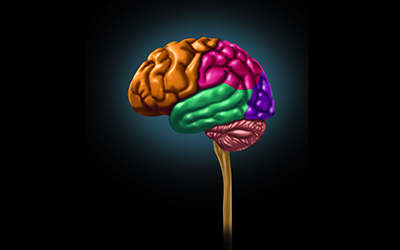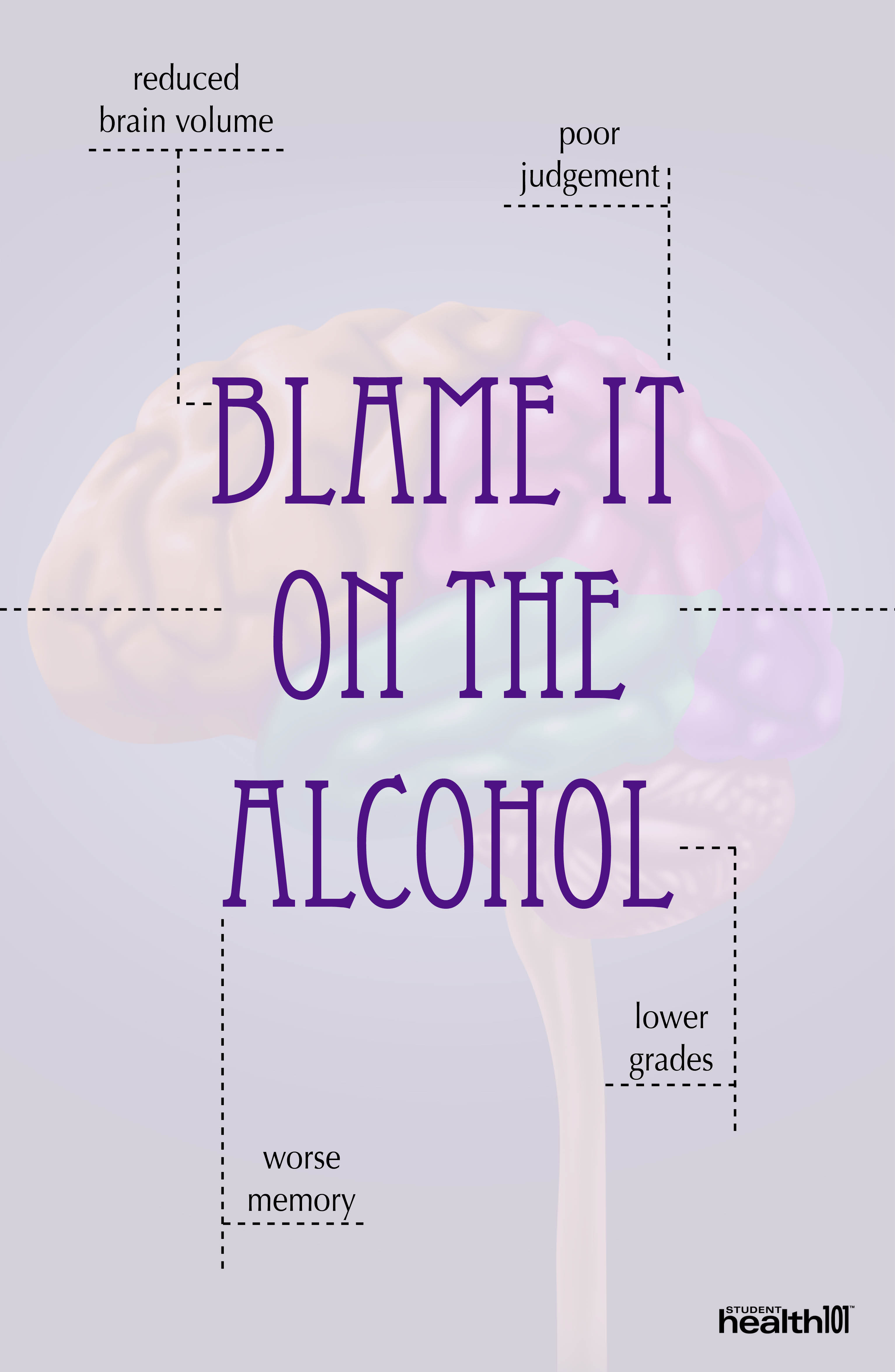The academic hangover
How your brain is affected by drinking

After a hard day or week, some of us look forward to unwinding with a drink or two. No big deal. We’re over the legal drinking age. We can still function and we’re mentally healthy, right?
Maybe not. First, those few drinks = a binge. Second, research is yielding awkward findings about the effects of those drinks on our brains—not just the night of, or the morning after, but well into the week, when we’re completing our mega-papers or prepping for finals.
studentvoice

Are you a binge drinker?
A hefty minority of college students are binge drinkers: one in three, according to Aware Awake Alive, a nonprofit organization based in Austin, Texas, dedicated to reducing alcohol-related deaths.
What exactly is a binge?
Binge drinking is also called heavy drinking. It’s a pattern of drinking over a two hour period that generally increases blood alcohol levels to at least 0.08 percent—the legal intoxication limit in most states—according to the National Institute of Alcohol Abuse and Alcoholism. For women, a binge typically means four or more drinks consumed in two hours. For men, it typically means five or more.
Not sure whether you binge? A self-diagnostic alcohol screening test.
How many students identify as binge drinkers?
Of 1,700 students who responded to a recent Student Health 101 survey:
- 13 percent self-identified as binge drinkers.
- 8 percent picked the correct definition of binge drinking from a list of six options.
When asked how often they drank 4+ alcoholic drinks (women) or 5+ (men) within two hours (the definition of binge drinking),
- 53 percent said never
- 32 percent said once a month or less frequently
- 15 percent said more frequently than once a month
The impact on the young adult brain
While some heavy drinkers may appear clinically healthy, their brain chemistry may be compromised, especially in young adults.
That’s because the frontal lobe rapidly matures well into our twenties. This developmental period is critical for “functions such as information processing, decision-making, and impulse control, in part by improving communication between brain circuits,” says Dr. Yasmin Mashhoon, a neuroscientist at McLean Hospital, Belmont, Massachusetts, and Harvard Medical School.
The effect on our brains, grades, and safety
“Alcohol use in young drinkers is associated with a reduction in different domains of memory by up to 14 percent,” says Dr. Marisa Silveri, also a neuroscientist at McLean Hospital, and associate professor of psychiatry at Harvard Medical School.The deficits affect working, verbal, and spatial memory. These effects linger for several days after drinking. “It could translate to the difference between an A and B or passing versus failing—or more importantly, making safe choices versus failing to inhibit poor choices, like driving while intoxicated,” says Dr. Silveri.
What do students say about the effect of alcohol on academic performance?
In a recent Student Health 101 survey, 62 percent of 1,700 respondents said they thought getting drunk affected their academic performance over the next few days.
“Cognitive impairments, short term memory, poor reaction time
and also unconsciousness.”
—Steve S., second-year student at Park University, Missouri
‘I’ve noticed the incapacity to recall information learned the previous day, and the ability to sleep during anything.”
—Audey H., third-year student at Pittsburgh State University, Kansas
“Being hungover in class isn’t a great way of learning.”
—Alex K., fourth-year student at Kennesaw State University, Georgia
“I’ve noticed that friends can’t focus for at least a day and their hangover prevents them from actually learning when in class.”
—Idan D., University of Massachusetts Amherst
“I don’t drink, but I have friends who do and I can tell when they were out late the night before at the bar. They struggle to focus in class and many times they’d just skip their first class altogether.”
—Name and university withheld
Altered brain structure and function
In a recent study, Dr. Silveri and her colleagues compared the brain structure and certain cognitive skills of college-aged light and heavy drinkers. The light drinkers reported an average of 1 ½ drinks per week over the previous three months. Heavy drinkers had consumed almost 12 drinks a week in the same period. Among the heavy drinkers, the cortical thickness, or outer brain volume, was significantly reduced.This has implications for how we think and learn. Among the heavy drinkers, the researchers found impaired control, self-perception, and self-care; greater risk-taking; and worse academic or occupational consequences compared to the light drinkers.
They also found lower levels of GABA (gamma-aminobutyric acid), the most important inhibitory (calming) neurotransmitter, in the frontal lobe. Deficiencies in GABA are associated with a range of psychiatric disorders including depression, anxiety, and insomnia.
In addition, the heavy drinkers had lower levels of the metabolite NAA (N-acetylaspartate). Deficiencies in NAA are associated with impaired neuronal health (brain cell integrity).
In another study by Harvard-McLean researchers, light drinkers and heavy drinkers took verbal learning tests. Heavy drinkers recalled fewer words than the light drinkers, showing possible learning differences between the groups, and also performed relatively poorly on word recognition. Adults in their early twenties appear particularly vulnerable to the effects of heavy drinking on memory acquisition, according to earlier research.
Does heavy drinking cause these effects in the brain, or are people with these brain differences predisposed to heavy drinking? Animal studies show that binge drinking leads to comparable brain changes. Human studies to unravel cause and effect are in the planning stages.
Which strategies do students favor for safe alcohol consumption?
- Stay with the same group of friends the entire time that you’re drinking
- Use a designated driver
- Eat before and/or with alcohol
- Keep track of how many drinks you’re consuming
- Stick with only one kind of alcohol
- Determine in advance not to exceed a set number of drinks
- Avoid drinking games
- Have a friend let you know when you’ve had enough
- Pace alcoholic drinks to no more than one per hour
- Alternate non-alcoholic with alcoholic beverages
The risk to young women
Your mental image of a heavy drinker might be a male student chugging a beer through a funnel. But recent decades have seen a dramatic rise in heavy drinking among young women. Twenty-four percent of US women aged 18-24 self-reported as binge drinkers in 2011, according to analysis of the Behavioral Risk Factor Surveillance System, a nationwide survey. Women living in households making $75,000 or more were the most likely to drink heavily.Why are women at risk for heavy drinking?
- “Lower GABA levels during the luteal phase, or the latter phase of the menstrual cycle, make women more at risk for alcohol abuse,” says Dr. Silveri.
- Women have a higher blood alcohol content than men after drinking the same amount, even after accounting for body weight and food consumption. That’s because women have less body water than men, and lower levels of alcohol dehydrogenase, an enzyme that breaks down alcohol.
- “New alcoholic beverages have been developed and marketed (e.g., flavored malt beverages) that are known to appeal to underage girls,”says Dr. Dafna Kanny, senior scientist in the Alcohol Program at the Centers for Disease Control and Prevention.
- The last few decades have seen an increasing social acceptance of alcohol consumption among women.
studentvoice







